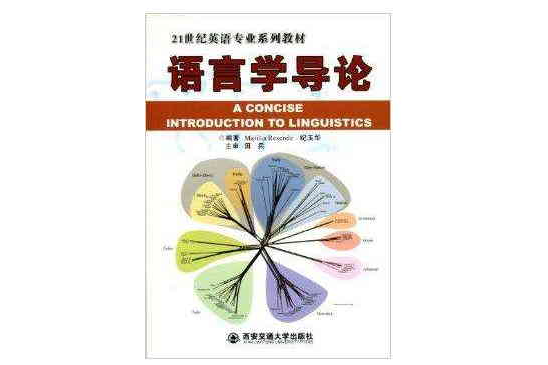《語言學導論》,本書內容簡介: 語言學導論一直以來都是大學英語專業學生的一門必修課程。本書旨在從語言學的一些基本分支、發展以及基本的一些理論知識做一系統性介紹,目的是為了讓英語專業學生通過學習對語言學知識有一個初步及總攬性的認識。
基本介紹
- 書名:21世紀英語專業系列教材:語言學導論
- 作者:Marilia Resende
- 出版日期:2012年11月28日
- 語種:簡體中文
- ISBN:9787560545813, 7560545815
- 外文名:A Concise Introduction to Linguistics
- 出版社:西安交通大學出版社
- 頁數:188頁
- 開本:16
- 品牌:西安交通大學出版社
基本介紹,內容簡介,作者簡介,圖書目錄,
基本介紹
內容簡介
《語言學導論》由Marilia Resende、紀玉華合著。
The book will contain 8 chapters and each chapter will deal with a different topic.Besides, each chapter includes learning objectives, an explanatory chart with the basic key concepts, a pretask to allow for warmup discussion, a comprehensive text to cover the key concepts relevant to the topic, and many followup tasks, which help students acquire a practical outlook of the course and involve either pair work or group work.In addition, there is a chapter summary for students to review, a checklist for selfassessment purposes, and a few critical thinking exercises to develop students' problemsolving skills.The idea is to make Linguistics an appealing and engaging subject for students but also to allow the teacher some flexibility to select the exercises he / she wishes to cover in every chapter as well as the tasks he / she finds more suitable for the targetgroup.
The book will contain 8 chapters and each chapter will deal with a different topic.Besides, each chapter includes learning objectives, an explanatory chart with the basic key concepts, a pretask to allow for warmup discussion, a comprehensive text to cover the key concepts relevant to the topic, and many followup tasks, which help students acquire a practical outlook of the course and involve either pair work or group work.In addition, there is a chapter summary for students to review, a checklist for selfassessment purposes, and a few critical thinking exercises to develop students' problemsolving skills.The idea is to make Linguistics an appealing and engaging subject for students but also to allow the teacher some flexibility to select the exercises he / she wishes to cover in every chapter as well as the tasks he / she finds more suitable for the targetgroup.
作者簡介
紀玉華,英語語言文學博士,博士生導師,廈門大學英文系主任,研究反向批評語言學和跨文化交際,在國內外學術期刊發表論文40餘篇,編寫出版專著、編著(如:《跨文化交際研究與教育中的批判性話語分析》、《英語演講與辯論教程》、與SandraAdams合著的《當代英語小品劇教程》)和譯著總計70餘種。曾在英國和美國留學,在美、英、加三國講學、研究、生活數年,熟悉多國文化,還應邀赴香港、台灣和大陸50多所大學做了近百場學術演講。MARILIA RESENDE,語言學博士,葡萄牙里斯本大學教授,現任廈門大學英文系外籍專家,精通英、葡、德、法、西等多國語言,長期從事普通語言學、套用語言學、外語教學法、課程設計、建設與測評、多元文化和跨文化交際研究,出版多部專著(如:與紀玉華合著的《跨文化交際實用教程》)和編著,在國際重要刊物上發表論文多篇。論文主要探討歷史語用學(特別是指示語)以及語言與文化的關係。
圖書目錄
THE AUTHORS
PREFACE
CHAPTER 1 LANGUAGE AND LINGUISTICS /1
WHAT IS THE RELATIONSHIP BETWEEN LANGUAGE AND LINGUISTICS?/2
1.Linguistics as a Science/2
2.Language and Linguistics/3
3.Origins and Functions of Language/5
4.Spoken and Written Language/8
5.Langue and Parole, Competence and Performance/10
6.Linguistics as a Field of Research/12
7.Different Approaches to Linguistics/13
8.Major Schools of Linguistics/14
CHAPTER 2 PHONETICS AND PHONOLOGY/20
WHAT ARE SPEECH SOUNDS? /21
1.Sounds and Letters/21
2.Production of Sounds/24
3.Classification of Sounds/26
4.Transcription of Sounds/31
5.Phonetics: Phones and Allophones/33
6.Phonology: Phonemes/34
7.Phonological Rules/36
8.Prosody: Intonation and Stress/38
CHAPTER 3 MORPHOLOGY/44
WHAT ARE WORDS? /45
1.Words and Word Classes/45
2.Morphs, Allomorphs and Morphemes/48
3.Types of Morphemes/49
4.Inflectional and Derivational Morphology/50
5.Word Formation Processes/53
CHAPTER 4 SYNTAX/65
WHAT IS GRAMMAR? /67
1.Grammar: Prescriptive and Descriptive/67
2.Grammaticality, Acceptability and Syntactic Ambiguity/68
3.Syntactic Structures/71
4.Syntactic Categories/74
5.Syntactic Functions/76
6.Types of Sentences/78
7.Types of Clauses/81
CHAPTER 5 SEMANTICS /86
WHAT IS MEANING? /87
1.Meaning, Sense and Reference/87
2.Levels of Meaning: Lexical and Sentential/89
3.Componential Analysis/93
4.Synonymy, Antonymy, Homonymy and Hyponymy/94
5.Entailment, Presupposition, Inconsistency, Contradiction, Tautology and Anomaly / 100
6.Metaphorical Usage/101
7.Idiomatic Usage/104
CHAPTER 6 PRAGMATICS /109
WHAT IS LANGUAGE USE? /110
1.Semantics versus Pragmatics/110
2.Reference and Inference/113
3.Cohesion and Coherence/115
4.Locutionary, Illocutionary and Perlocutionary Acts /117
5.The Cooperative Principle/119
6.Conversational Implicature/120
7.The Politeness Principle /122
8.Concept of 'Face' /124
CHAPTER 7 LANGUAGE VARIATION /130
WHAT IS LANGUAGE VARIATION? /131
1.Sociolinguistics Language and Society /131
2.Accents and Dialects /132
3.Sociolects or Social Dialects /137
4.Register and Jargon/141
5.Jargon, Slang and Argot/143
6.Slang,Taboo and Euphemisms/144
7.Language and Culture/146
CHAPTER 8 LANGUAGE CHANGE/153
WHAT IS LANGUAGE CHANGE? /154
1.Language and History/154
2.Internal Causes of Language Change/156
3.External Causes of Language Change/158
4.History of English/161
5.Changes in Pronunciation and Spelling/167
6.Changes in Grammar/168
7.Changes in Vocabulary/169
8.Changes in Meaning/171
APPENDIX 1: KEY TO EXERCISES /178
APPENDIX 2.BIBLIOGRAPHY 187
PREFACE
CHAPTER 1 LANGUAGE AND LINGUISTICS /1
WHAT IS THE RELATIONSHIP BETWEEN LANGUAGE AND LINGUISTICS?/2
1.Linguistics as a Science/2
2.Language and Linguistics/3
3.Origins and Functions of Language/5
4.Spoken and Written Language/8
5.Langue and Parole, Competence and Performance/10
6.Linguistics as a Field of Research/12
7.Different Approaches to Linguistics/13
8.Major Schools of Linguistics/14
CHAPTER 2 PHONETICS AND PHONOLOGY/20
WHAT ARE SPEECH SOUNDS? /21
1.Sounds and Letters/21
2.Production of Sounds/24
3.Classification of Sounds/26
4.Transcription of Sounds/31
5.Phonetics: Phones and Allophones/33
6.Phonology: Phonemes/34
7.Phonological Rules/36
8.Prosody: Intonation and Stress/38
CHAPTER 3 MORPHOLOGY/44
WHAT ARE WORDS? /45
1.Words and Word Classes/45
2.Morphs, Allomorphs and Morphemes/48
3.Types of Morphemes/49
4.Inflectional and Derivational Morphology/50
5.Word Formation Processes/53
CHAPTER 4 SYNTAX/65
WHAT IS GRAMMAR? /67
1.Grammar: Prescriptive and Descriptive/67
2.Grammaticality, Acceptability and Syntactic Ambiguity/68
3.Syntactic Structures/71
4.Syntactic Categories/74
5.Syntactic Functions/76
6.Types of Sentences/78
7.Types of Clauses/81
CHAPTER 5 SEMANTICS /86
WHAT IS MEANING? /87
1.Meaning, Sense and Reference/87
2.Levels of Meaning: Lexical and Sentential/89
3.Componential Analysis/93
4.Synonymy, Antonymy, Homonymy and Hyponymy/94
5.Entailment, Presupposition, Inconsistency, Contradiction, Tautology and Anomaly / 100
6.Metaphorical Usage/101
7.Idiomatic Usage/104
CHAPTER 6 PRAGMATICS /109
WHAT IS LANGUAGE USE? /110
1.Semantics versus Pragmatics/110
2.Reference and Inference/113
3.Cohesion and Coherence/115
4.Locutionary, Illocutionary and Perlocutionary Acts /117
5.The Cooperative Principle/119
6.Conversational Implicature/120
7.The Politeness Principle /122
8.Concept of 'Face' /124
CHAPTER 7 LANGUAGE VARIATION /130
WHAT IS LANGUAGE VARIATION? /131
1.Sociolinguistics Language and Society /131
2.Accents and Dialects /132
3.Sociolects or Social Dialects /137
4.Register and Jargon/141
5.Jargon, Slang and Argot/143
6.Slang,Taboo and Euphemisms/144
7.Language and Culture/146
CHAPTER 8 LANGUAGE CHANGE/153
WHAT IS LANGUAGE CHANGE? /154
1.Language and History/154
2.Internal Causes of Language Change/156
3.External Causes of Language Change/158
4.History of English/161
5.Changes in Pronunciation and Spelling/167
6.Changes in Grammar/168
7.Changes in Vocabulary/169
8.Changes in Meaning/171
APPENDIX 1: KEY TO EXERCISES /178
APPENDIX 2.BIBLIOGRAPHY 187

